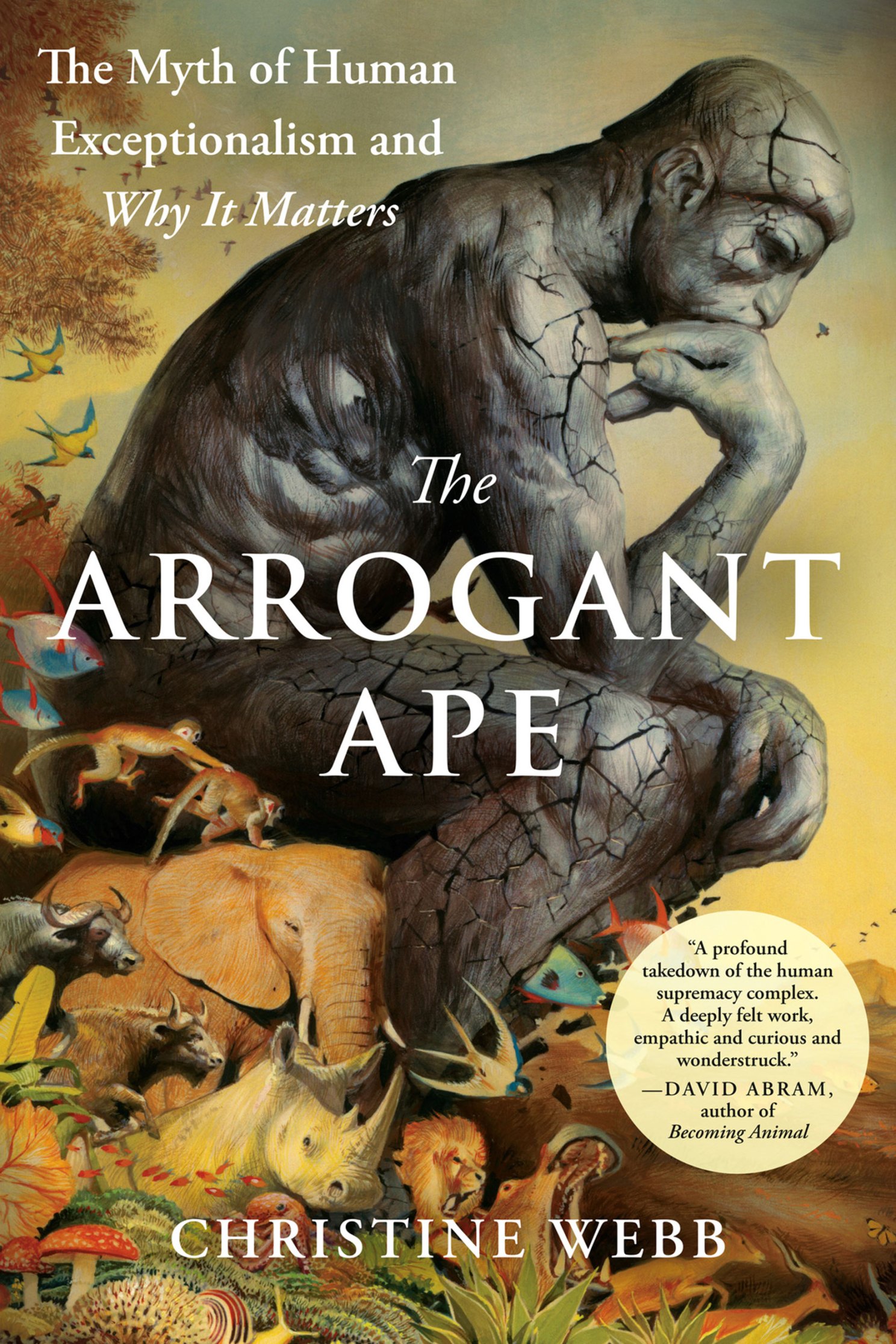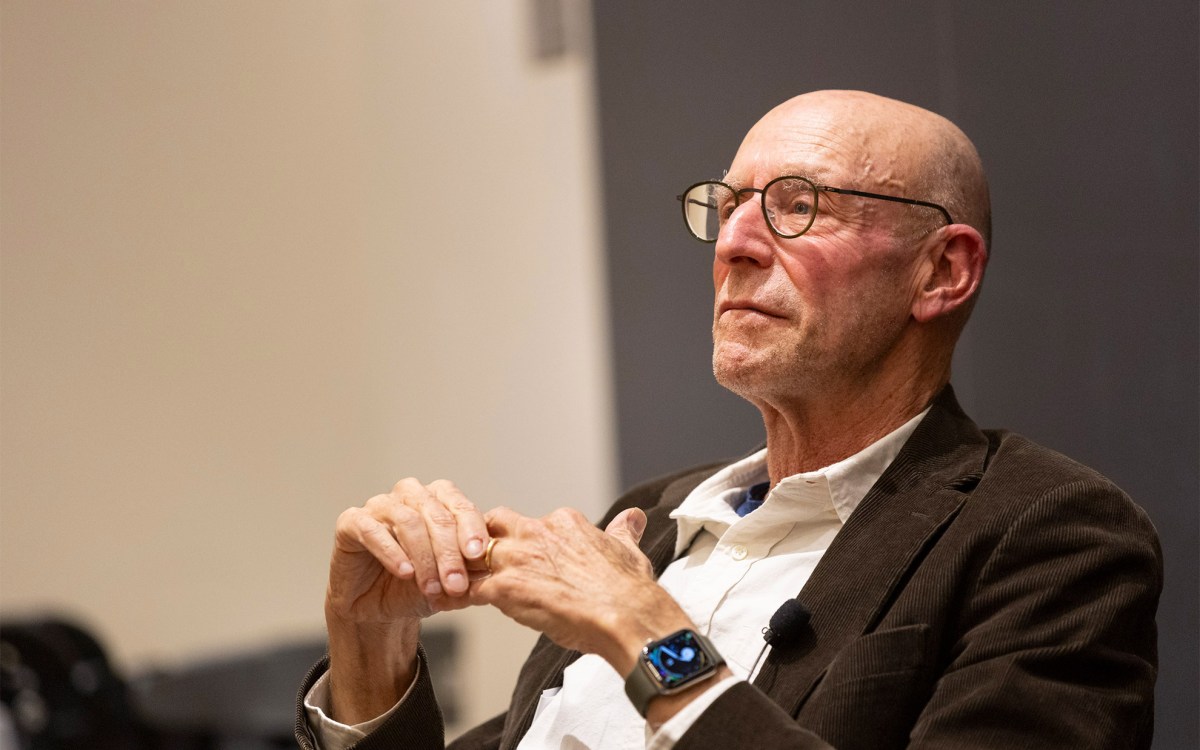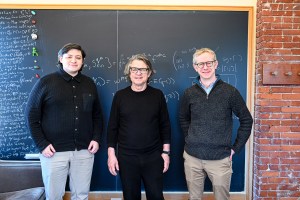
‘Human exceptionalism is at the root of the ecological crisis’
Saving the planet requires getting over ourselves, argues author of ‘The Arrogant Ape’
In the grand story of evolution, the crowning human distinction is our big brain. But our large heads have been slow to recognize a less admirable trait of Homo sapiens — self-centeredness.
The human presumption of superiority and entitlement to exploit the natural world is deeply rooted in our religious, cultural, and scientific traditions — and now we are witnessing the consequences, said Christine Webb, a former Harvard lecturer and author of “The Arrogant Ape: The Myth of Human Exceptionalism and Why It Matters.”
“Human exceptionalism is at the root of the ecological crisis,” Webb told a Science Center audience of more than 100 people recently as part of the Harvard Science Book Talks. “This pervasive mindset gives humans a sense of dominion over the rest of nature, set apart from and entitled to commodify the Earth and other species for their own exclusive use.”
The central thesis of her book is that anthropocentrism — or what Webb calls the “human superiority complex” — has pushed our planet to environmental crises such as mass extinctions, rising sea levels, forest fires, and more.
“I’ve come to think of the arrogant ape not as a species, or a culture, or even an individual, but as a tragic protagonist in a Greek drama, blinded by their own hubris,” said Webb. “This unfortunate and dangerous way of viewing our world is a brainwashing of such major proportions that many people remain entirely unaware of it.”
“When you measure the world with a ruler made for humans other species will inevitably look inferior.”

Christine Webb.
© Eva de Breed
Without doubt, humans are unique in many attributes (we are the only species known to send rockets into space or convene book talks). But all species, Webb wrote, have evolved specialized adaptations to their environments and are wondrous in their own rights. Still, we humans tend to see our own characteristics as more exalted — and, thanks to our technological prowess — view the rest of the natural world as a resource that we are entitled to harvest without constraint.
As Webb wrote, “Human exceptionalism suggests that what is distinctive about humans is more worthy and advanced than the distinguishing features of other forms of life.”
Now an assistant professor at New York University, Webb previously served as a lecturer in Harvard’s Department of Human Evolutionary Biology. The book grew out of her experience teaching an undergraduate seminar here also titled “The Arrogant Ape.”
“So many of the ideas that are folded into this book are students’ ideas,” she told the audience. “I was incredibly inspired by the discussions that took place.”
The book traces how the human sense of exceptionalism has deep roots in the Judeo-Christian religious tradition, Western thought, and even science.
Shakespeare’s Hamlet called humans “the paragon of animals.” In the 18th century, Carl Linnaeus, the founder of biological classification, designated the taxonomic order that includes humans, apes, and monkeys as “primates” to assign us first rank and dubbed our species “Homo sapiens” or “the wise man.” In the 1730s, poet Alexander Pope advised that, “The proper study of mankind is man.” Accordingly, the humanities celebrate the study of you-know-who.
The very notion of “progress” came to mean human command over nature. Thanks to our ever-advancing scientific and technological knowledge — and a global population that has now reached 8 billion — humans lay claim to an ever-greater share of the world’s resources. As Webb wrote, “the notion of human distinction and the exploitation of the natural world go hand in hand.”
Human exceptionalism has become an unquestioned assumption — something rarely articulated or opened to debate. As Webb told the audience, “it derives power from its invisibility.”
Science too has absorbed this bias. Two centuries ago, Charles Darwin warned of the human habit of flattering ourselves with self-affirming categorizations, but generations of evolutionists continued falling prey to the same old traps. According to Webb, a primatologist who has studied wild baboons and gorillas in Africa, comparative studies often are designed with confirmation bias or use human attributes as metrics of evolutionary advancement.
“When you measure the world with a ruler made for humans,” she said, “other species will inevitably look inferior.” Webb drew a laugh when she showed a clip from the satirical newspaper The Onion headlined “Study: Dolphins Not So Intelligent On Land.”
Yet, Webb argued, the human presumption of superiority is a learned behavior. Many children exhibit a natural empathy for animals and humans have an innate sense of wonder for nature that Harvard biologist E.O. Wilson termed “biophilia.”
The remedy to our ecological crisis, she believes, is embracing a trait that is often undervalued: humility. In reawakening ourselves to the wondrous diversity of nature, we might become more willing to preserve it.
“Shedding this anthropocentric lens, I believe, can yield very humbling realizations,” she concluded in her talk, “and this humility might impart true wisdom — the quality our species, Homo sapiens, has assigned itself, yet one we can only ever truly realize by unlearning human exceptionalism.”





